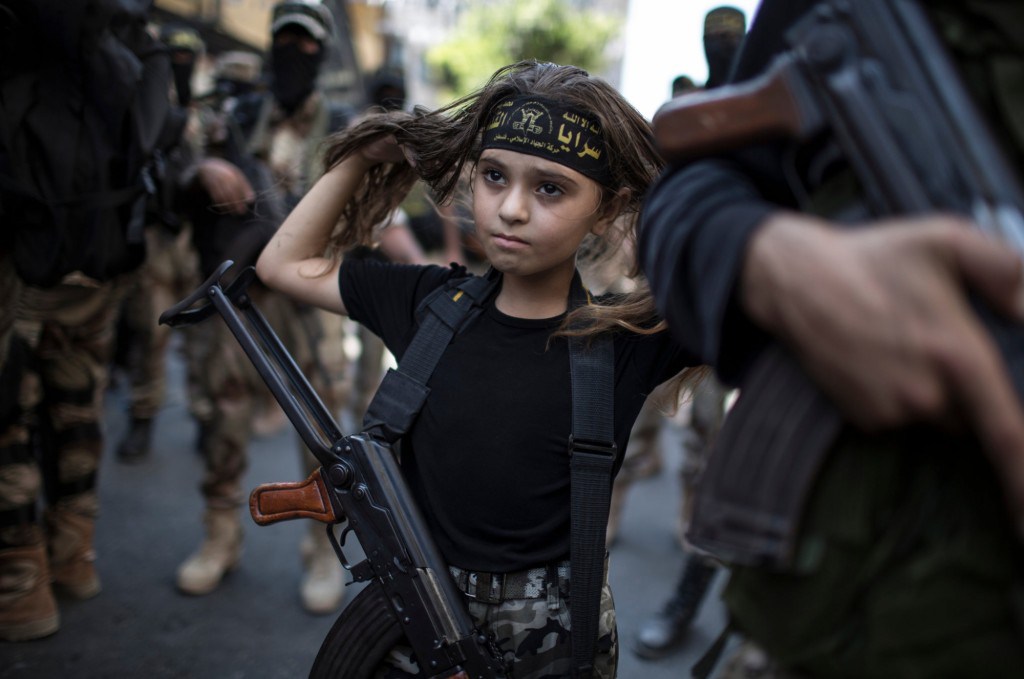This article was originally published at Sixteen Minutes to Palestine by Sami Kishawi.

(Photo credit: Wissam Nassar, New York Times). Source.
Saying that this photograph recently resurfaced would imply that it had somehow gotten buried. But that is simply not true. Published for the New York Times just days after Israel pulled back on its most deadly assault on the Gaza Strip yet, the image sent and continues to send shockwaves around the world. What was a child doing in the middle of that victory rally? Why was the child outfitted with a gun? There is an evident beauty to the photograph. Most comments I’ve come across allude to it. From the vantage point of the art critic I sometimes secretly aspire to be, the image is wonderfully framed and composed. The bokeh pushes your eyes to hers. Her hairflip puts you in middle of the action. There is an intensity that resonates more from her facial expression and the way she composes herself than from any of the weapons caught in the shot. The darkness of the shadows gives it an eerie silence. We are frozen in a moment of time so powerful. Incidentally, I hadn’t seen the photograph when it first made the rounds on photography blogs and image sharing websites. I have only just seen it, introduced to me by an album on Imgur succinctly titled “Humans”. I traced the image to other webpages, gleaning whatever I can from readers’ comments and the context of the pieces in which the photograph featured. Considering how quick the internet’s warriors are to turn everything to flames, I was surprised to bear witness to a compassion not normally associated with images of Palestinians, especially those from the occupied Gaza Strip. Even the darkest of souls could not hurl vulgarities at the child. Something was clearly so off-putting with the image as a whole that it forced people to think before they spoke. Ignoring those who tried unconvincingly to patronize the subject’s culture or religion, the overwhelming number of responses I read noted the general failure of humankind. We are to blame. We made this photograph possible. After all, are we as humankind not at fault for allowing decades of occupation to go on without pausing to think that whitewashing it the way we do makes us complicit? Are we not at fault for giving Israel the go-ahead to try for the third time since 2008 to turn Gaza into a sea of dust? Very commonly we hear how awful it is that children are touched by war. True, they should never be. But extend this further. War and conflict should never have to touch anyone, and if it is an absolute necessity — and there are instances when it is — it should and must be contained so that those not willing to be a part of it remain unaffected. This is the ideal. We are so, so far from that. I hope this image shames you a thousand times. I hope it shames you as it has shamed me. I tried but could not find the subject’s name. It would have been nice to give her that much at least. But what I do know is that she was there when the missiles hit. She was one of the survivors. She woke to the sounds of blasts, breathed in the metallic aftermath, and watched her countrypeople die. And if they were not dying, they were running to the dying. She was there for that. Her eyes have seen things that cannot possibly be put into words. The smell of burnt flesh and days-old blood is difficult enough to describe. Imagine describing it for fifty-one days and fifty-one nights. I saw a photograph long ago of a small street in Gaza City that was running red with blood. She saw the real thing — possibly even waded in it. Her presence was not out of the ordinary. Islamic Jihad had hosted a parade to mark the Palestinian victory. Although the numbers are lopsided — Palestinian losses were far greater: more than 2,100 dead compared to 72 Israelis dead — the occupied territory’s armed groups took home the strategic win. They had proven everyone wrong, successfully and deliberately directing more than 90% of their assaults and counter-assaults against military targets — legal under international law. Israel, on the other hand, proved everyone right by firing openly into the dense coastal enclave. More than 70% of the Palestinians killed were civilians, multiple agencies have reported. Hundreds of school-aged children were among them. This is her victory, too. There was cause for celebration — not only as a way of coping with the losses but because, in many ways, it was well deserved. One of the strongest militaries in the world had been outsmarted on so many occasions during its unwelcome stay that it was more important for the Israeli government to call everything off. The PR hit played into the favor of the Palestinians. Israel had gotten too used to getting away with murder out in the open. So the streets were packed. No matter which flag and staff of the political spectrum you pledged allegiance to, you welcomed your fighters back home. You thanked them for their service. You blessed them for protecting you. They kissed your head for not abandoning them or their land, for making their fight and especially their return worth it. You were so proud. It was the proudest you have felt in years. This much is shared by communities all around the world. It is not uncommon to parade to your soldiers’ return. The reality is, however, that this has become a family tradition, a regular custom meant to mask or explain away the funerals and wakes that have outnumbered any victory rally so far. And only because we, the silent international community, have given it reason to become one. Appreciate the beauty and the message behind this photograph. But also let it shame you.











